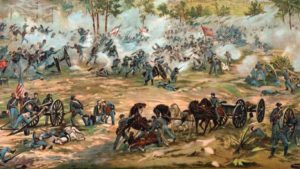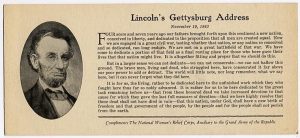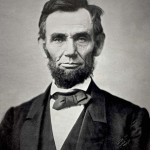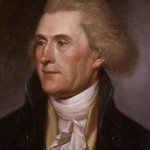 James Wilson, a founding father from Pennsylvania, once said that “[l]aw and liberty cannot rationally become the objects of our love, unless they first become the objects of our knowledge.”
James Wilson, a founding father from Pennsylvania, once said that “[l]aw and liberty cannot rationally become the objects of our love, unless they first become the objects of our knowledge.”
Abraham Lincoln understood this well. A student of America, the Declaration of Independence and the country’s first principles, law and liberty were objects of Lincoln’s love and knowledge. He possessed a special gift for sharing that love and knowledge in a way that was inter generational. There’s no better example than the Gettysburg Address, which at 272 words would nicely fit a 21st Century blog post, with room for ads and adaptable to click bait.
 President Lincoln delivered the 272 word Gettysburg Address on November 19, 1863 on the battlefield near Gettysburg, Pennsylvania.
President Lincoln delivered the 272 word Gettysburg Address on November 19, 1863 on the battlefield near Gettysburg, Pennsylvania.
“Fourscore and seven years ago our fathers brought forth, on this continent, a new nation, conceived in liberty, and dedicated to the proposition that all men are created equal. Now we are engaged in a great civil war, testing whether that nation, or any nation so conceived, and so dedicated, can long endure. We are met on a great battle-field of that war. We have come to dedicate a portion of that field, as a final resting-place for those who here gave their lives, that that nation might live. It is altogether fitting and proper that we should do this. But, in a larger sense, we cannot dedicate, we cannot consecrate—we cannot hallow—this ground. The brave men, living and dead, who struggled here, have consecrated it far above our poor power to add or detract. The world will little note, nor long remember what we say here, but it can never forget what they did here. It is for us the living, rather, to be dedicated here to the unfinished work which they who fought here have thus far so nobly advanced. It is rather for us to be here dedicated to the great task remaining before us—that from these honored dead we take increased devotion to that cause for which they here gave the last full measure of devotion—that we here highly resolve that these dead shall not have died in vain—that this nation, under God, shall have a new birth of freedom, and that government of the people, by the people, for the people, shall not perish from the earth.”
Lincoln, America’s Greatest Student of the Declaration of Independence

 These immortal words did not arise from a void. They came from Lincoln’s long study of the law and of American principles. In 1859 he shared his love and understanding of the Declaration of Independence and what Jefferson had achieved in expressing the American mind:
These immortal words did not arise from a void. They came from Lincoln’s long study of the law and of American principles. In 1859 he shared his love and understanding of the Declaration of Independence and what Jefferson had achieved in expressing the American mind:
“All honor to Jefferson–to the man who, in the concrete pressure of a struggle for national independence by a single people, had the coolness, forecast, and capacity to introduce into a merely revolutionary document, an abstract truth, applicable to all men and all times, and so to embalm it there, that to-day, and in all coming days, it shall be a rebuke and a stumbling-block to the very harbingers of re-appearing tyranny and oppression.”
It takes more than reading the Gettysburg Address to understand it. It takes regular study of America’s Founding and it’s principles to develop the love and affection described by James Wilson.






[…] would say in his Gettysburg Address, “The world will little note nor long remember what we say here but cannot forget what they […]